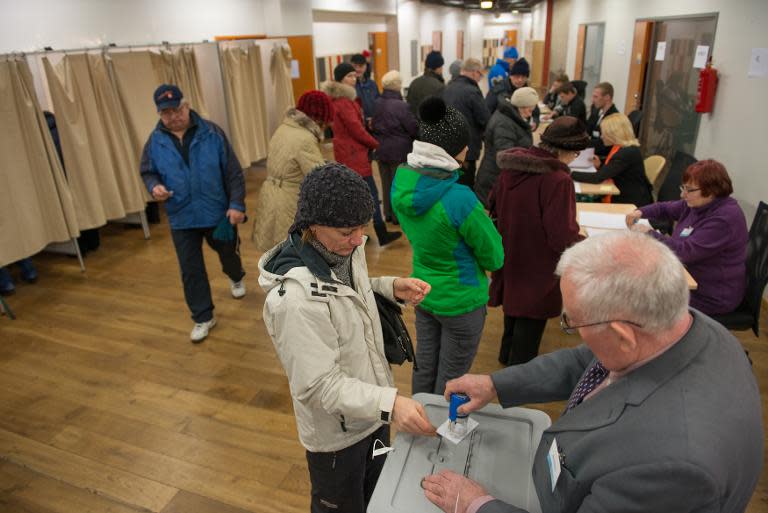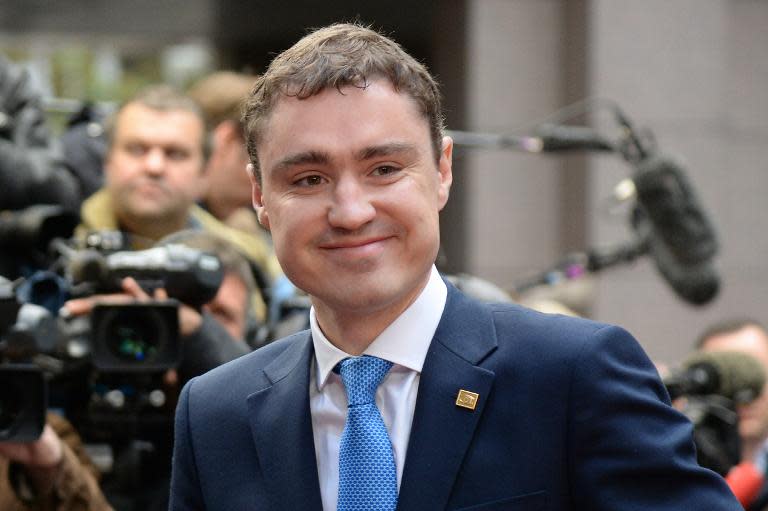Estonia's pro-NATO Reform party wins vote overshadowed by Russia
Estonia's governing pro-NATO Reform party topped parliamentary elections Sunday, defeating a Kremlin-oriented rival amid concerns over a militarily resurgent Russia, but analysts warned that forging a coalition would be difficult. President Toomas Hendrik Ilves is expected to ask Reform chief, outgoing Prime Minister Taavi Roivas, to build a coalition on the basis of the 30 seats his party won in the 101-member parliament. "The Reform Party is the 2015 winner of the parliamentary elections," Roivas announced on Estonia's ERR public television late Sunday as official results showed his centrist Reform party won despite losing three seats. The fresh-faced 35-year-old ruled out a coalition with the opposition pro-Kremlin Centre party, which was up one seat to 27, nodding instead to the Social Democrats, his current junior coalition partners, who scored 15 seats, down by four. "Reform will be able to form a government... (but) coalition talks might be complicated," leading Estonian political commentator Ahto Lobjakas told AFP, noting increased volatility with six parties now in parliament, up from the previous four. The parliamentary newcomers are a free-market liberal party and an anti-immigration conservative party, who secured 15 seats between them. Analysts expect Roivas to renew his party's coalition with the Social Democrats, possibly buttressed by the conservative IRL. It was the biggest loser Sunday, down nine seats to 14. "In terms of Estonia's pro-Western orientation, commitment to EU, NATO, all this will remain and possibly become more pronounced," Lobjakas added, describing the entry of the two newcomers as a swing to the right. Moscow's annexation of Crimea last year and its meddling in eastern Ukraine have galvanised the European Union, including eurozone member Estonia where a quarter of the 1.3 million population are ethnic Russians. Military manoeuvres by Moscow on Estonia's border just days ahead of the vote further stoked deep concerns in Europe that the Kremlin could attempt to destabilise countries that were in its orbit during Soviet times. NATO is countering the moves by boosting defences on Europe's eastern flank with a spearhead force of 5,000 troops and command centres in six formerly communist members of the alliance, including one in Estonia. "If they (the Russians) come in here, Estonia can't do anything... I'm not sure NATO will help us out," Pyotr Sirotkin, a 25-year-old student at Tallinn University, told AFP as he cast his ballot in the capital. The EU's youngest head of government, Roivas joined a chorus of Baltic leaders demanding more NATO troops, hardware and air patrols to counter Moscow's heightened military moves. Pre-election polls had shown Centre, backed mainly by ethnic Russians, narrowly ahead, but party leader Edgar Savisaar, 64, stirred controversy last year when he backed Russia's annexation of Crimea from Ukraine. - 'Bread-and-butter' - Some voters were less concerned about the threat posed by Moscow and more focused on bread-and-butter issues. Hot election topics included proposals to triple the monthly minimum wage to 1,000 euros ($1,131) and lower social security premiums among other measures. "I believe there are much more important things than worrying about Russia," 18-year-old student Eve Tonisson told AFP as she voted in Viimsi, a town just north of the capital Tallinn. "Many young people are moving abroad because of higher wages there... I personally don't think I'm going to stay in Estonia," she said, reflecting a troubling demographic trend in the tiny nation as Estonians leave to search for a better life. Long a paragon of fiscal responsibility in the EU, which it joined in 2004, Estonia posted 1.8 percent economic growth in 2014, with 2.5 percent expansion expected this year. Joblessness hovered around seven percent last year. Deep reforms and years of painful austerity paved the way to Estonia's 2011 eurozone entry and some here believe their comparatively poor country should not pump out more money to save indebted Greece. "Greece should be able to handle things themselves now," said Martin Kallikivi, a 29-year-old media employee from Viimsi. However, like many Estonians, he understands the social toll that austerity can take and the fact that it will be felt for generations. "For many years (the) government has not been giving enough support for families with children and Estonia's population is decreasing because of that," Kallikivi said. Total turnout tallied at 63.7 percent.

 Yahoo Finance
Yahoo Finance 


